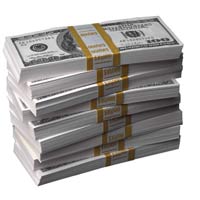In morning European trading euro falls vs US dollar
The 13-nation euro fell slightly against the U.S. dollar Tuesday, despite increasing speculation of another interest rate cut from Washington.

In morning European trading the euro bought US$1.4205, down from US$1.4238 late in New York on Monday, a day when the currency hit a new all-time high of US$1.4284.
The dollar also gained on the British pound, which fell to US$2.0391 from US$2.0442 in New York, but dropped slightly against the Japanese yen to purchase 115.40 yen from 115.77 on Monday.
The Australian and Canadian dollars continued to hold strong against the U.S. currency. The Australian dollar bought US$0.8825, down slightly from an 18-year high of US$0.8948 the day before, while the Canadian dollar bought US$0.9952, up from US$0.9937 in New York.
The Canadian dollar, popularly known as the "loonie" for the picture of a swimming loon on the gold-colored dollar coin, hit a new 31-year high of US$1.0093 Monday.
On Monday, the Arizona-based Institute for Supply Management reported that the American manufacturing sector expanded at a slower-than-expected rate in September, suggesting there was room for the U.S. Federal Reserve to consider another rate cut later this month.
The dollar's string of record lows began after the Fed cut rates last month by a larger-than-expected half percentage point.
Lower U.S. interest rates, used to jump-start the economy, can weaken its currency as investors transfer funds to countries where their deposits and fixed-income investments bring higher returns.
The embattled dollar garnered some support, however, on comments from European Central Bank President Jean-Claude Trichet regarding recent currency-market developments.
Trichet on Monday said he was paying "extreme" attention to remarks by U.S. officials that a strong dollar is good for the U.S.
Trichet said last week he was paying "great attention" to the remarks and his adoption of the word "extreme" hinted that the speed and the strength of the euro's rise may be becoming uncomfortable to policymakers.
Subscribe to Pravda.Ru Telegram channel, Facebook, RSS!


